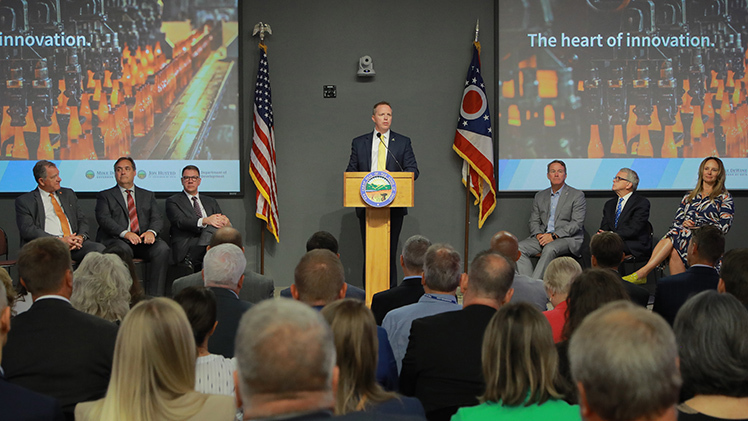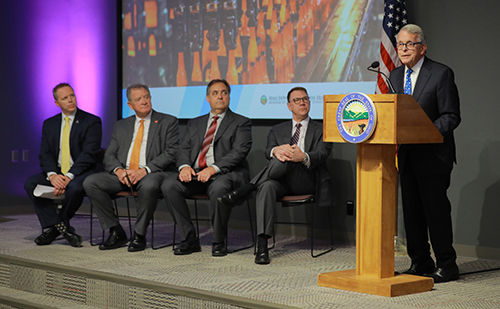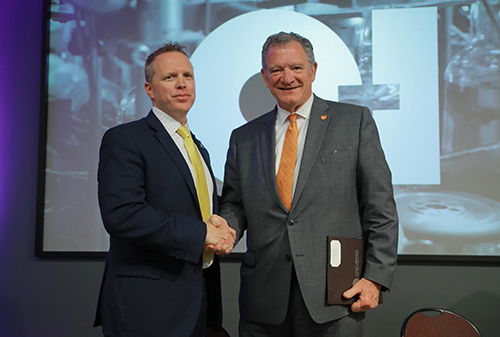The University of Toledo is set to play a major role in the new Northwest Ohio Glass Innovation Hub focused on strengthening the region’s national leadership in glassmaking and solar energy technology.
The $31.3 million investment by the Ohio Department of Development to establish the Innovation Hub was announced Monday by Ohio Gov. Mike DeWine and Lt. Gov. Jon Husted.

Interim President Matt Schroeder speaks during a Monday news conference with Ohio Gov. Mike DeWine announcing the new Northwest Ohio Glass Innovation Hub.
The Northwest Ohio Glass Innovation Hub is part of a $125 million Department of Development program aimed at making the state a national leader in innovation and economic development through several regional innovation hubs.
“From the early days of consumer glassware to today’s highly efficient thin-film solar panels, Toledo has been a leader in glass manufacturing and The University of Toledo has been supporting this industry through advances in research and development particularly in photovoltaics innovation,” UToledo Interim President Matt Schroeder said. “We are excited to leverage our University’s expertise and industry partnerships to drive the northwest Ohio economy forward and further position this region for growth through both research partnerships and educating the next generation of advanced degree graduates.”
UToledo and Bowling Green State University are the consortium’s leading academic partners for scientific research and preparing highly trained graduates for careers in the glass and solar industries through science, technology, engineering and math (STEM) degree programs.
“Northwest Ohio is world-renowned for its innovation and leadership in glass, and in further leveraging the power of two research universities, each anchors of our region with unique areas of expertise, this grant will serve as a catalyst in harnessing the advanced technologies of the future for our region’s glass industry,” BGSU President Rodney K. Rogers said. “This collaboration, led by industry and bolstered by higher education, will drive prosperity for our region and state, strengthening our future as the leading global hub of glass technologies, attracting talent from around the world and demonstrating the power and relevancy of higher education for a strong and vibrant economy.”

The $31.3 million investment by the Ohio Department of Development to establish the Innovation Hub was announced Monday by Ohio Gov. Mike DeWine and Lt. Gov. Jon Husted.
In addition to UToledo and BGSU, partners in the Northwest Ohio Innovation Consortium include O-I Glass, Owens Corning, First Solar, Libbey Glass, NSG Pilkington North America, Glass Manufacturers Industry Council, Actual Reality, CelSian, Owens Community College, ConnecToledo and the Regional Growth Partnership.
“This is a collaboration that will build on Toledo’s legacy as the glass capital of the world, and we believe will propel this region into the forefront of glass and solar innovation worldwide,” DeWine said.
Key research themes of the Northwest Ohio Glass Innovation Hub include expanding electrification of glass furnaces, decarbonization of the glass industry, improving glass melting technologies and performance, making glass recycling more efficient, and expanding the use of artificial intelligence in glassmaking to reduce energy usage, extend furnace life and improve operational efficiency.
There also are plans to create a Glass Center of Excellence within the innovation hub to help focus industry-led research in collaboration with UToledo and BGSU faculty experts.

UToledo Interim President Matt Schroeder and BGSU President Rodney K. Rogers shake hands at Monday’s news conference announcing that both universities are the lead academic partners on the Ohio Department of Development effort to strengthen the region’s leadership in glassmaking and solar energy technology.
UToledo brings to the consortium the nation’s top academic solar energy research center with the Wright Center for Photovoltaics Innovation and Commercialization, along with a strong roster of research engineers and scientists from the College of Engineering and the College of Natural Sciences and Mathematics.
UToledo also is commencing a national search to recruit a top-tier glass scientist or engineer to UToledo to provide the hub with a leading faculty member dedicated to glass research.
Dr. Frank Calzonetti, vice president for innovation and economic development at UToledo and a member of the NOIC board, and the UToledo Office of Research provided important grant writing support for the collaborative effort.
“This shows that the University can have an important role in contributing to a regional transformation around innovation,” he said. “The research that will come out of this consortium will directly benefit local industry leaders. We heard their needs, and we have the faculty expertise and laboratory facilities to take on this work and move it into commercial outcomes.”
The local consortium has committed to matching the state’s investment with $10 million in local funds, including $1.6 million from UToledo and $1.5 million from BGSU.
The innovation hub is expected to create 1,600 new jobs and contribute $284 million to the local economy over the next five years.